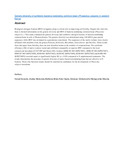Please use this identifier to cite or link to this item:
http://ir-library.mmust.ac.ke:8080/xmlui/handle/123456789/1559Full metadata record
| DC Field | Value | Language |
|---|---|---|
| dc.contributor.author | Kawaka, Fanuel | - |
| dc.contributor.author | Makonde, Huxley | - |
| dc.contributor.author | Dida, Mathews | - |
| dc.contributor.author | Opala, Peter | - |
| dc.contributor.author | Ombori, Omwoyo | - |
| dc.contributor.author | Maingi, John | - |
| dc.contributor.author | Muoma, John | - |
| dc.date.accessioned | 2021-06-03T11:23:22Z | - |
| dc.date.available | 2021-06-03T11:23:22Z | - |
| dc.date.issued | 2018-11-15 | - |
| dc.identifier.uri | https://doi.org/10.1371/journal.pone.0207403 | - |
| dc.identifier.uri | https://journals.plos.org/plosone/article?id=10.1371/journal.pone.0207403 | - |
| dc.identifier.uri | http://r-library.mmust.ac.ke/123456789/1559 | - |
| dc.description.abstract | Biological nitrogen fixation (BNF) in legumes plays a critical role in improving soil fertility. Despite this vital role, there is limited information on the genetic diversity and BNF of bacteria nodulating common bean (Phaseolus vulgaris L.). This study evaluated the genetic diversity and symbiotic nitrogen fixation of bacteria nodulating common bean in soils of Western Kenya. The genetic diversity was determined using 16S rRNA gene partial sequences while BNF was estimated in a greenhouse experiment. The sequences of the native isolates were closely affiliated with members from the genera Pantoea, Klebsiella, Rhizobium, Enterobacter and Bacillus. These results show that apart from rhizobia, there are non-rhizobial strains in the nodules of common bean. The symbiotic efficiency (SE) of native isolates varied and exhibited comparable or superior BNF compared to the local commercial inoculants (CIAT 899 and Strain 446). Isolates (MMUST 003 [KP027691], MMUST 004 [KP027687], MMUST 005 [KP027688], KSM 001 [KP027682], KSM 002 [KP027680], KSM 003 [KP027683] and KSM 005 [KP027685]) recorded equal or significantly higher SE (p < 0.05) compared to N supplemented treatments. The results demonstrate the presence of genetic diversity of native bacteria nodulating bean that are effective in N fixation. These elite bacterial strains should be exploited as candidates for the development of Phaseolus vulgaris inoculants. | en_US |
| dc.language.iso | en | en_US |
| dc.publisher | Plos One | en_US |
| dc.subject | Genetic,diversity, symbiotic, bacteria, nodulating ,common bean, | en_US |
| dc.title | Genetic diversity of symbiotic bacteria nodulating common bean (Phaseolus vulgaris) in western Kenya | en_US |
| dc.type | Article | en_US |
| Appears in Collections: | Gold Collection | |
Files in This Item:
| File | Description | Size | Format | |
|---|---|---|---|---|
| Genetic diversity of symbiotic bacteria nodulating common bean.pdf | 197.71 kB | Adobe PDF |  View/Open |
Items in DSpace are protected by copyright, with all rights reserved, unless otherwise indicated.
